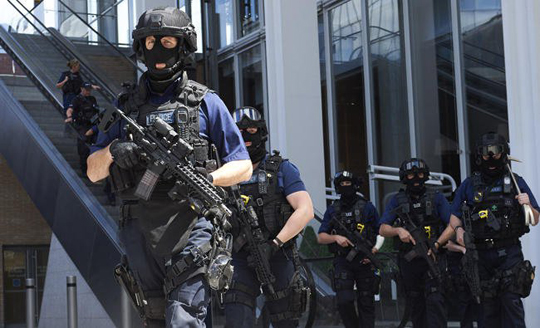London, Jun 5: British Prime Minister Theresa May has called for stronger counter-terrorism measures following Saturday's killing spree on the streets of London — the third deadly terror attack in the UK in less than three months.

Three attackers drove a hired van into pedestrians on London Bridge and stabbed others nearby, killing seven people and wounding 48, before the assailants were shot dead by police.
“It is time to say enough is enough,” May said in a statement outside her Downing Street office on Sunday.
“We cannot and must not pretend that things can continue as they are,” she added, calling for new measures that could include longer jail sentences for some offenses and new cyberspace regulations.
May said the series of attacks in the UK were not connected in terms of planning and execution, but were inspired by what she called a “single, evil ideology of Islamist extremism” that represented a perversion of Islam and of the truth.
“While we have made significant progress in recent years, there is — to be frank — far too much tolerance of extremism in our country,” she said, urging Britons to be more robust in stamping it out in society.
King Salman sent a cable of condolences to May.
“We have received the news of the terrorist attack that took place in London, which resulted in deaths and injuries,” King Salman said.
The Muslim World League (MWL) condemned the terrorist attack.
MWL Secretary-General Mohammed bin Abdul Karim Al-Issa stressed upon the league's consistent position toward terrorism and its supporters.
Terrorists aim to target the UK's excellence as a model of tolerance and human coexistence, he said, adding that these groups' ideology includes exporting their misery and despair as well as attacking the values of this civilized state in order to create a civilizational and cultural conflict.
Daesh claimed responsibility for the London attack.
One analyst on terrorism told Arab News the incident comes at a time when Daesh is stepping up attacks on global targets.
Peter Lehr, lecturer in Terrorism Studies at the Center for the Study of Terrorism and Political Violence at St. Andrews University, Scotland, pointed to a previous call by Daesh spokesman Abu Mohammed Al-Adnani, who urged followers to attack Western targets by any means necessary.
“Smash his head with a rock, or slaughter him with a knife, or run him over with your car, or throw him from a high place,” Al-Adnani said in 2014.
Lehr said: “This attack perfectly fits the bill. What is important in this regard is that unlike the Manchester suicide bombing, carrying out such an attack doesn't require any advanced skills such as bomb making nor any lengthy preparations, that make it more likely to be discovered by intelligence (services) or police before the perpetrators are ready to strike.”
Eyewitnesses of Saturday's terror atrocity described harrowing scenes as the attackers' white van veered on and off the bridge sidewalk, hitting people along the way. The three men then ran into an area packed with bars and restaurants, stabbing people indiscriminately.
One eyewitness told Arab News that she saw a man with his throat cut stumbling away from the scene. “We saw a man coming off the bridge with blood all over him and it looked like he had his throat slashed,” she said. “He was holding his neck.”
Mark Rowley, head of counter-terrorism police, said eight officers had fired about 50 bullets to stop the attackers, who were wearing what turned out to be fake suicide vests.
Police on Sunday arrested 12 people in east London, where at least one of the attackers is believed to have resided, according to Sky News.
Saturday's attack came five days before the UK parliamentary election on Thursday, which May said would go ahead as planned. The string of terror attacks in the UK is likely to be central issue of debate in the last few days of campaigning.
Around two weeks ago, a suicide bomber killed 22 children and adults at a concert by US singer Ariana Grande in Manchester in northern England. In March, in an attack similar to Saturday's, five people died after a man drove into pedestrians on Westminster Bridge in central London and stabbed a policeman.
World leaders, including those from the Middle East, were quick to condemn the recent attacks in London.
An official source at Saudi Arabia's Ministry of Foreign Affairs expressed the Kingdom's “strong condemnation and denunciation of the attacks.”
In a statement to the Saudi Press Agency, the source offered the Kingdom's condolences to the families of the victims and to the UK government and people, wishing a speedy recovery to the wounded.
The official source reiterated the “Kingdom's solidarity with the United Kingdom against terrorism and extremism which target security and stability around the world without exception.”





Comments
Add new comment